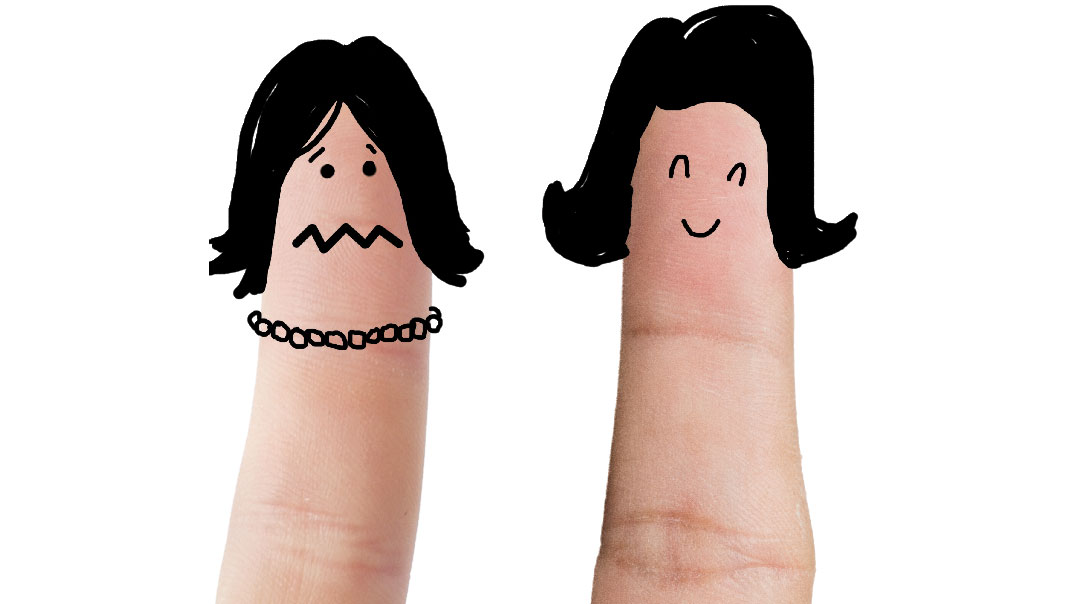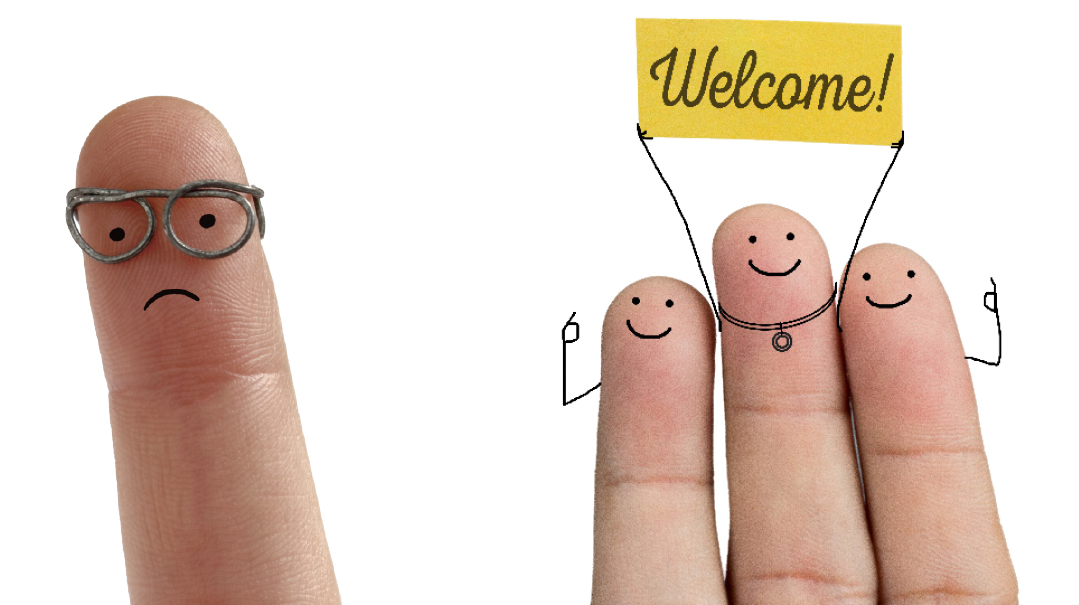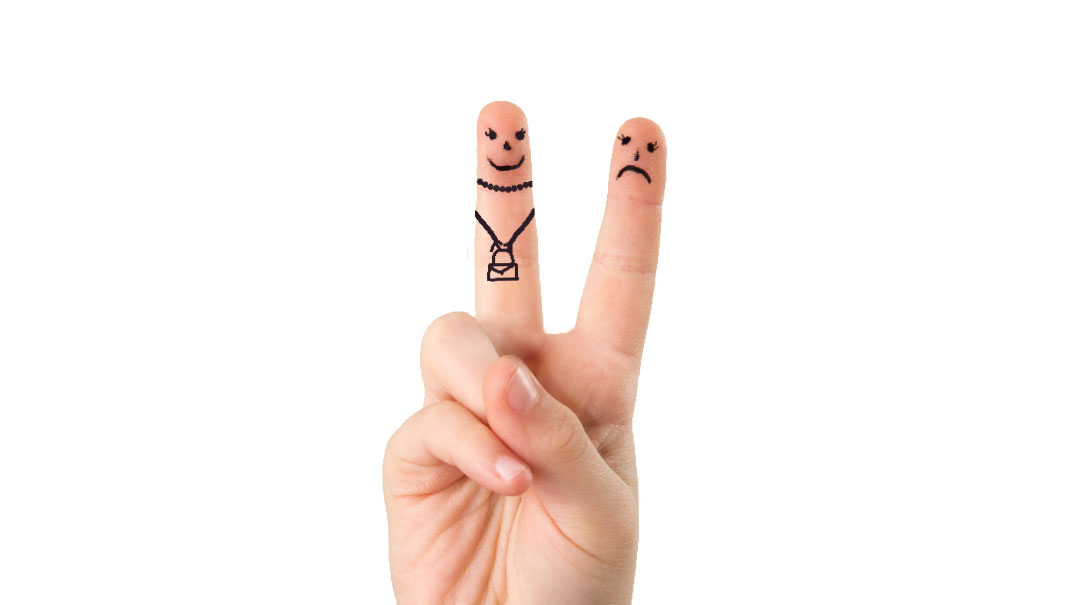“Every Time We Spend Time, I Feel Inadequate”

I don’t judge or view myself against others — except when I interact with Tova

You asked
I have a friend, “Tova,” whom I’ve known since my teenage years. We went to seminary together and embarked on a similar life trajectory: got married, moved to a kollel community, and worked while our husbands were in kollel and our families grew.
Fast-forward 20 years, and we’re still friends and still live in the same community. But life happened in the meantime. I cut back on my working hours as my family grew and my husband went out to work. Tova’s husband is a respected rosh chaburah in a large kollel, and she works long hours to support the family. The number of children they have is in the double digits, and she seems to maintain a perfectly managed house, with her kids always looking put together — despite having almost no outside help.
I am, baruch Hashem, very happy. My husband and I made life choices based on our circumstances, with the clear direction of daas Torah, and I don’t have regrets. In general, I don’t walk around with complexes. I don’t judge or view myself against others — except when I interact with Tova. Every time we speak or spend time, I’m left feeling inadequate.
Tova reminds me of all the dreams and visions I had when leaving seminary. She’s lived up to everything I aspired to, and she’s the perfect poster child for those dreams, while I made adjustments in so many areas that weren’t what I envisioned years before. In short, the life my friend is living is one I imagined I would. Until I didn’t.
I’ve thought about our relationship, my view of myself and my life, and without a doubt I’m happy with my choices. There are plenty of other people in my life whom I admire and are more successful than I, whether in running a house, the amount of help they need, their chinuch, their jobs, their ruchniyus… I admire them and learn from them without feeling inferior.
So why do I have such a strong complex and view my life choices as compromises when I’m around Tova? How can I overcome these feelings?
Or should I just surround myself with other friends whom I feel comfortable with and keep my interactions with Tova to a minimum? She’s a friend and a good person, and I probably shouldn’t let the friendship go. Is there a way to hold on to the friendship without feeling bad around her?
We answered
Mrs. Yael Kaisman is an educator and kiruv professional who counsels individuals and couples in Lakewood, NJ.
Before we discuss this relationship, let’s discuss dreams and their places in our lives. Let’s recognize them for what they are: she’ifos are wonderful and produce something great — they help us maximize our development. They don’t guarantee what Hashem hands us or the results.
Sometimes, those dreams are based on external, social indicators of success. That tricks us into thinking that they’re ruchniyus-based, but when we peel away layers, we might find that external pressure can be a bigger factor than we realized. In addition, women who dream of long-term learners often hope that the dedication of the learning years will translate into their husbands becoming roshei yeshivah or maggidei shiur.
Yet it doesn’t seem that Hashem wants every single husband to be a lifetime learner. He guides us to a different path via the circumstances He sends us, or through our discovery of our or our husbands’ realities. He redirects us from our dreams because he doesn’t need us in that role — He (kivyachol) needs us for something else.
If our motives are truly ruchniyus-centered, we wouldn’t mourn our loss, and we wouldn’t force ourselves to “accept it,” which implies a bedieved. We’d embrace it, because we’re doing ratzon Hashem! We wanted our avodas Hashem to be a different job, yet Hashem told us, “No, I don’t need you for that role; here’s another role you can play.” It’s no different than our daughters crying that they want a part in the school play that wasn’t given to them.
There are certainly times when people attain their dreams. It may be because they worked hard and were zocheh; other times Hashem gave them a gift. Believing that people only get what they dreamed of because they worked for it is a myth. If it’s not meant for you, hard work won’t give it to you. A woman isn’t necessarily great because Hashem gave her the opportunity to live her dream — she may be fortunate that He granted her the opportunity.
You say that you feel secure about the trajectory your life has followed and the choices you’ve made to get to where you are. Have you accepted (i.e. “made peace” with a perceived bedieved) that you made adjustments that pulled you away from your dreams, or have you embraced what you do as ratzon Hashem by living the life He wants you to live, with the husband He wants you to have, the number of children He has given you, etc.?
You know you chose well, but it sounds like you still believe there’s a better way. Who said? Who decided what was better? Your seminary teachers? Your idealistic 19-year-old self? It doesn’t help that often girls are taught that there is one ideal goal, and if you want it badly enough you will be zocheh to it, which isn’t so.
What about your current aspirations? Do you have new dreams for where you are now? We should constantly ask ourselves: What are my dreams now? Am I pursuing them? Are they manageable and in sync with the life Hashem wants me to live?
Develop new dreams, but without external voices of society-mandated success; we’ll always feel inadequate in the face of external social pressures. Maybe my husband isn’t what I dreamed of; my job is to respect him for his greatness. Maybe I had a picture of what my children would be — but He gave me a different picture. Am I loving and nurturing them for the greatness they’re achieving and for their personal challenges — or am I bemoaning my realities?
Now let’s talk about your friend who seems to be living your old dreams. Your friend may have pushed harder than you, her husband may have been more capable than yours, or she might have been given these as gifts. We’ll never know, and it doesn’t matter — that’s not our cheshbon. The fact that Hashem gave her the gifts that you dreamed of doesn’t make her great, and certainly not greater than you. She might be great for other reasons, but being given opportunities by Hashem doesn’t make us great.
That niggling tug you feel when reminded of lost dreams is normal; dreams are powerful, and it’s okay to feel that little sting. What isn’t okay is the feeling of inadequacy your interactions engender. It’s possible you still have work to do in terms of real self-acceptance. You can use those feelings as an opportunity to ask yourself, “Did I fall short or did I follow the path Hashem set out for me?”
It sounds like you already know the answer. You made good choices. When you feel that inadequacy, remind yourself of why you didn’t take that route. When we strengthen ourselves in our own minds, that spills over and makes us stronger in our interactions with people who once made us feel deficient.
Another reason for that feeling — and here is where the friendship finally comes in — is that you’re seeing a very unrealistic view of your friend’s life. Your friend isn’t sharing challenges, so you see a glorified, aggrandized version of your old dream. You don’t see her vulnerability, so you think she’s living this awesome dream life.
Now, seeing a friend’s vulnerability isn’t so that we can say, “Oh, she also has problems, so I can feel better about my life…” That’s not what vulnerability means. Vulnerability is honesty and realness.
People who present themselves as invulnerable make others feel inadequate. You can’t maintain a friendship without vulnerability. The greater the ability to be vulnerable in a relationship, the more room there is for intimacy and friendship.
For this reason, this is a relationship that needs reevaluation. There’s no such thing as a person who is all success and no challenges, no matter what it looks like on the outside. If this friend is someone who shares no vulnerability with you, then this relationship gets bumped down to “acquaintance” rather than “friendship” because it lacks connection.
And that’s fine. We can have warm feelings toward old friends who’ve become “good acquaintances” for old times’ sake, but we’re not in the realm of friendship anymore. You don’t have to leave the relationship; by all means continue to maintain it for what it is, but realize that it’s lacking depth and honesty, which moves it out of the friendship category.
This should also help put your uncomfortable feelings into perspective. Your feelings of inadequacy are based on a perception that isn’t realistic. If you can make mental switches in these two areas, you might feel much more comfortable in the presence of this… wonderful acquaintance.
Being Real
Mrs. Chanie Wasser is the early childhood director of Torah Prep School in St. Louis, Missouri.
Acknowledging vulnerabilities is the glue that creates intimacy in a relationship. The word rei’a, a friend, is first used in the Torah in connection to Yehudah, when he shared what happened between himself and Tamar with a rei’a.
The Torah is teaching us something significant here. Rav Munk writes in The Call of the Torah that someone can only be called your friend if you can be vulnerable with him.
Real relationships need that element of honesty. Vulnerability doesn’t mean kvetching, complaining, or “dumping” on the other person; it means openness and honesty that shows realness, our human side. A person who presents herself to the outside as a super-powerhouse or the picture of perfection isn’t being real and limits her ability to be close to others.
It’s actually a great chesed to take stock and honestly evaluate how we present to others. Do we come across as invulnerable to outsiders? Do we only share our successes but never our struggles? There are people who make everything seem so effortless, so easy, and that’s lovely, and maybe there are things that are easier for them than for others, but there is no one who never struggles. People who present this way make others feel incompetent and uncomfortable. Do we want to be that person?
We contribute to society when we acknowledge challenges, when we’re honest and don’t downplay our efforts, saying “it was nothing.” Acknowledging difficulties creates healthier, more enjoyable relationships.
We should ask ourselves why we’re reluctant to expose our struggles. We should recognize that it’s a dishonest display of who we are and try to figure out where that need stems from. In truth, it’s a chesed to ourselves when we do this! We open ourselves up to greater connection with others, putting ourselves into the category of rei’a, a real friend.
(Originally Featured in Family First, Issue 681)
Oops! We could not locate your form.












